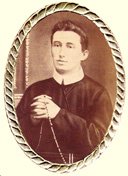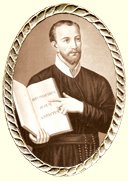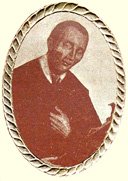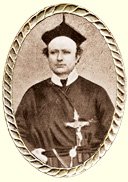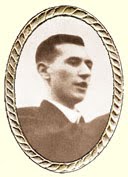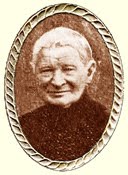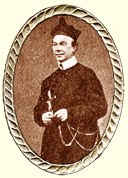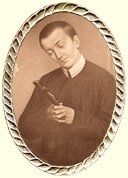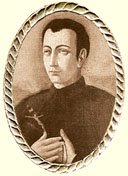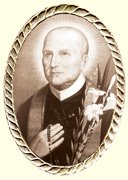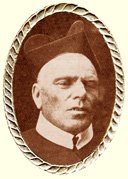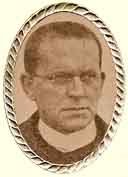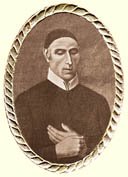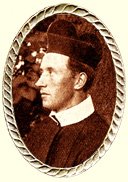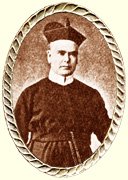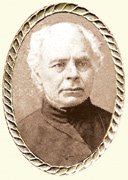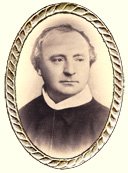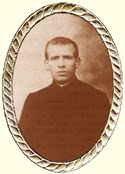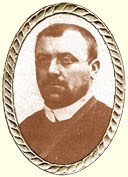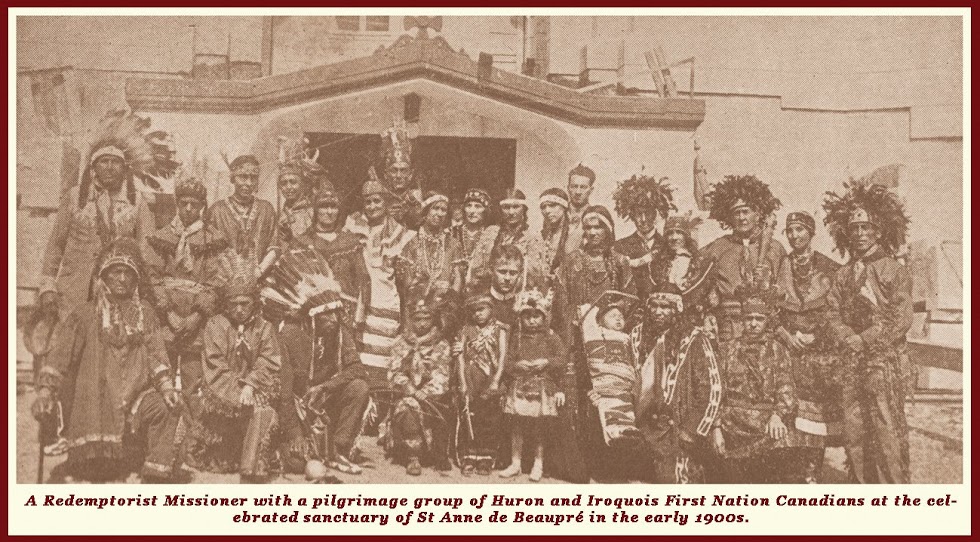The Servant of God, Rev. Fr. Victor Humarque, C.SS.R. (1817-1896)
 The Rev. Fr. Victor Humarque, know universally by the name of the “Old blind Father,” died, full of years and merits, on December 18, 1896, in the Redemptorist Monastery of Antony in France.
The Rev. Fr. Victor Humarque, know universally by the name of the “Old blind Father,” died, full of years and merits, on December 18, 1896, in the Redemptorist Monastery of Antony in France.He was born in Colmar, on September 15, 1817, of parents originating from Saint-Dié (Vosges), and he went with his family to live in that city a short time later. His father had obtained a position as eulogist at the cathedral, and despite his unceasing labour, it was only with great effort that he was able to provide bread for his twelve children, for he spent his free time giving individual lessons. From the age of twelve, Victor was happy to add to his father’s earnings the humble payment that his early talent brought him. This child proved to have real talent from his tenderest childhood, and the first reward of his study of music theory was the benefit of becoming a teacher of several rich children of Saint-Dié. At the same time, he was the most distinguished student at the best high school in the city. At the age of twenty, he obtained a superior diploma and baccalaureate, the crowning of his secondary studies. The high school directors had already entrusted him with a share in their work, despite his youth, as student supervisor. A brilliant future opened before him in university teaching. But God was calling him urgently to the priesthood.
He was ordained on October 30, 1842, by Mgr. de Jerphanion, Archbishop of Albi, who indicated to the young priest his intention of bringing him into his service. However, this was prevented by the prelate’s departure, and Fr. Humarque was named the vicar of Saint-Amé.
There he devoted himself for two years to the humble duties of a country priest. His excessive zeal ruined his health. The bishop of Saint-Dié, Mgr. Manglard, learned with sadness the state of this young priest, and listening only to the inspiration of his charitable heart, brought him into his palace, and built up the health of his ailing assistant. Fr. Humarque repaid his benefactor service for service. Successively tutor for the Count of Vesvrette and the Marquis of Lambertye, when he heard that Mgr. Manglard had just been struck by illness, he left his position and stationed himself at the bedside of the man who had become to him like a second father. He attended him with a devotion inspired by that devotion earlier shown toward him, and it came to pass that he gave the prelate final absolution and received his last sigh.
Fr. Caverot, vicar-general of Besançon, attended the funeral of Mgr. Manglard. After the ceremony, he walked beside Fr. Humarque, who, with mourning heart, extolled the charity of his benefactor, and concluded, “The man who must succeed him is to be pitied.” Several months later, Mgr. Caverot was appointed to the seat of Saint-Dié. Upon seeing Fr. Humarque, he said to him, “Is it not true that I am indeed to be pitied?”
Mgr. Caverot brought into his service this distinguished and devoted young priest. As director of the cathedral supervision and secretary-assistant to the bishop, he gave him all the proofs of affectionate attachment which had bound their hearts ever since they had first come together. When, obeying the call of God who wanted him to be “the poor priest and priest of the poor,” Fr. Humarque left the Saint-Dié Episcopal palace in 1856 to enter the noviciate of the Redemptorist Fathers, Mgr. Caverot could not hold back his tears. He kept in his room a photograph of the humble priest, and in the various houses where he lived he honoured him by many visits even after he became Archbishop of Lyon. As for Fr. Humarque, we could say that he had won the esteem and veneration of the entire clergy of Saint-Dié.
We would now like to follow, step by step, our dear brother in the journey of his religious career. Opening at the eleventh hour, it nevertheless doubled its course, and one could say that he carried the weight of a long journey full of weariness and merits.
Professed in 1857, he successively evangelized the regions of which the monasteries of Saint-Nicolas-de-Port, Châteauroux and Avon are the apostolic centres. He was a notable saviour of souls, still more by his exemplary virtues, his incessant prayer, and his heroic sufferings than by his oratorical talent.
Alas! In the month of May 1879, a cruel disease attacked the pupils of his eyes. At first Fr. Humarque wept, but he broke into song with the Magnificat. As the poet said:
When the eye of my body is extinguished,
the eye of my spirit is illuminated.
the eye of my spirit is illuminated.
Indeed, from that day on the countenance of Fr. Humarque, became more endearing than ever. His affable sanctity was a mixture of piety and poetry, of benevolent charity and austere duty. By the order of his superiors, he wrote poetry for relaxation. He left a great number of poems, many of which have been published, and of hymns to the Sacred Heart and to the souls in Purgatory, which people know and appreciate. “The hymns of Fr. Humarque,” Mgr. Marchal tells us, “as those of a true artist, have a simple and popular allure; they inspire love by their pious sweetness, and are easily remembered by their simplicity.”
But above all, when the hand of God closed his eyes, he consecrated his time from then on to prayer and to fraternal charity. In doing this he did not have to do himself violence; grace and nature prompted him to this type of life. Slave to his religious rule, he promptly settled himself, until eight days before his death, to all the duties of community life. And still more, as the long hours Fr. Humarque passed before the Blessed Sacrament were not enough to satisfy his thirst for union with God, he added to those his hours of solitude, when his confreres took walks to relax. Everywhere, always, he would be seen with his lips moving and his rosary in hand. Piety, the piety of a saint, was the soul of all his life.
From this Thabor where he elevated himself in prayer, he loved to come down to the plains where he would exercise his charity. His inability to work directly for the salvation of souls afflicted him, but he rejoiced in remembering that he was as a missionary by his prayers and sufferings. He was also happy to have kept some interaction with souls through his fellow-brothers, and through the secular priests to whom he was spiritual director. Obliged by his blindness to depend more on his confreres’ charity than on his own heart’s appeal toward devotion and compassion, he witnessed in return of each service, however small, a touching recognition that continued to express itself in a thousand ways. After all, in his relations he carried by charity his wide share of interest and edification. Fr. Humarque was very witty. Especially in the years when his imagination had kept all the springtime freshness of his impressions, his conversations were a rolling fire of points, jokes, puns and riddles. In the midst of the small change that he spent to please his neighbour, this man of God would always slip in beside it, like a golden coin, some pious reflection or edifying story. Even in the days of decay, when the soul seemed ready to sink under the weight of bodily infirmity, suddenly a leap full of spirit would bring to the lips of the old blind Father this touching smile peculiar to children and the elderly. He loved above all to repay the acts of generosity that he had received during his long career. The memories of his pure youth particularly attracted him, by this charm that comes to all of us, when old age is come, bringing us back to the distant years, already coloured by the reflections of sunset…
Such was the man of God. After eight days of collapse, during which, until the last sigh, his soul held itself united constantly to God by prayer. At the moment when he expired, the feast of the Expectation of the Blessed Virgin was reaching its end and Saturday was about to begin.

After death, the face of Fr. Humarque took on an expression of heavenly serenity, and as was said by his confreres and by the many persons who came to pray near his open bier, they felt moved to pray to him rather than to pray for him, and to touch to him their rosaries, crosses, and medals. All who knew him proclaim his sanctity, and nobody doubted that the eyes of the old blind Father, closed for twenty-six years to the light of day, contemplate the light of eternal glory. †
But above all, when the hand of God closed his eyes, he consecrated his time from then on to prayer and to fraternal charity. In doing this he did not have to do himself violence; grace and nature prompted him to this type of life. Slave to his religious rule, he promptly settled himself, until eight days before his death, to all the duties of community life. And still more, as the long hours Fr. Humarque passed before the Blessed Sacrament were not enough to satisfy his thirst for union with God, he added to those his hours of solitude, when his confreres took walks to relax. Everywhere, always, he would be seen with his lips moving and his rosary in hand. Piety, the piety of a saint, was the soul of all his life.
From this Thabor where he elevated himself in prayer, he loved to come down to the plains where he would exercise his charity. His inability to work directly for the salvation of souls afflicted him, but he rejoiced in remembering that he was as a missionary by his prayers and sufferings. He was also happy to have kept some interaction with souls through his fellow-brothers, and through the secular priests to whom he was spiritual director. Obliged by his blindness to depend more on his confreres’ charity than on his own heart’s appeal toward devotion and compassion, he witnessed in return of each service, however small, a touching recognition that continued to express itself in a thousand ways. After all, in his relations he carried by charity his wide share of interest and edification. Fr. Humarque was very witty. Especially in the years when his imagination had kept all the springtime freshness of his impressions, his conversations were a rolling fire of points, jokes, puns and riddles. In the midst of the small change that he spent to please his neighbour, this man of God would always slip in beside it, like a golden coin, some pious reflection or edifying story. Even in the days of decay, when the soul seemed ready to sink under the weight of bodily infirmity, suddenly a leap full of spirit would bring to the lips of the old blind Father this touching smile peculiar to children and the elderly. He loved above all to repay the acts of generosity that he had received during his long career. The memories of his pure youth particularly attracted him, by this charm that comes to all of us, when old age is come, bringing us back to the distant years, already coloured by the reflections of sunset…
Such was the man of God. After eight days of collapse, during which, until the last sigh, his soul held itself united constantly to God by prayer. At the moment when he expired, the feast of the Expectation of the Blessed Virgin was reaching its end and Saturday was about to begin.

After death, the face of Fr. Humarque took on an expression of heavenly serenity, and as was said by his confreres and by the many persons who came to pray near his open bier, they felt moved to pray to him rather than to pray for him, and to touch to him their rosaries, crosses, and medals. All who knew him proclaim his sanctity, and nobody doubted that the eyes of the old blind Father, closed for twenty-six years to the light of day, contemplate the light of eternal glory. †
“Lovable poetry,
O charm of my life,
Come each morning,
And be for me a window.
Look for who will take you,
Even for who will read you.
Poor little verses,
Written on the hop,
Without plan,
without measure,
By an unsure hand.
In writing you,
My soul is ravished,
But I forget you,
At the same moment.
I may write you,
But cannot read you again.
And behold why,
When they criticise you,
Without reply,
I may remain silent.”
[Fr Victor Humarque, C.SS.R.]
O charm of my life,
Come each morning,
And be for me a window.
Look for who will take you,
Even for who will read you.
Poor little verses,
Written on the hop,
Without plan,
without measure,
By an unsure hand.
In writing you,
My soul is ravished,
But I forget you,
At the same moment.
I may write you,
But cannot read you again.
And behold why,
When they criticise you,
Without reply,
I may remain silent.”
[Fr Victor Humarque, C.SS.R.]




















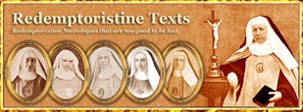
.jpg)









